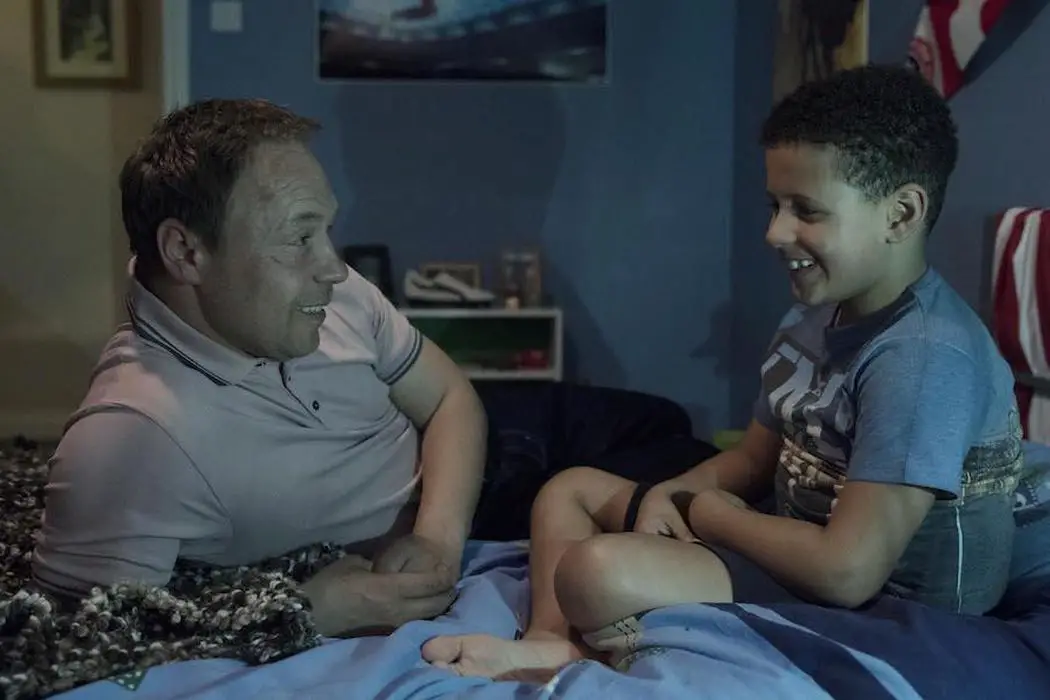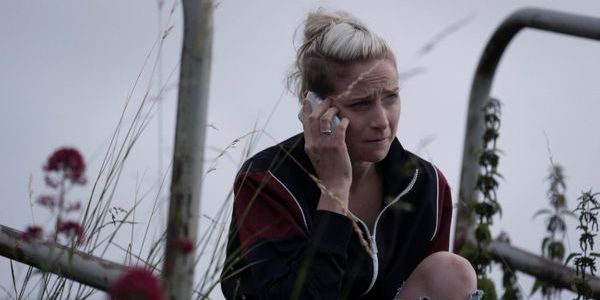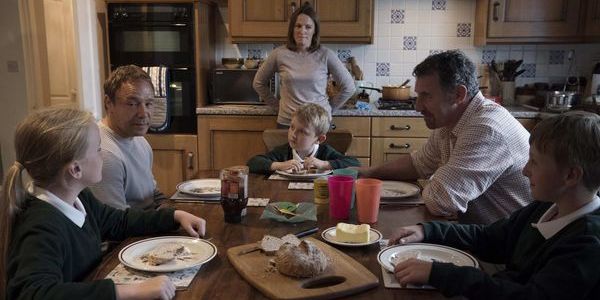THE VIRTUES: The Power Of Abuse

Former film student from Scotland turned writer and film reviewer.
“The mass of men lead lives of quiet desperation” wrote Henry David Thoreau in Civil Disobedience and Other Essays, before being adapted into his later work, Walden. Although it was written all the way back in 1849 you feel it could have been written today, such is the relevance of its inherently powerful message. It applies perfectly to Joe McCarthy (an astonishingly portrayed by Stephen Graham), protagonist of Shane Meadows‘ latest effort The Virtues.
When we first meet Joe he is staring solemnly out of the window of a van, an untold number of thoughts likely swirling around in his head. We follow him through his dreary, drudging routine and come to understand him as a man utterly thrashed by life. His is a quiet, harrowing existence. The one respite Joe has from this existence comes in the form of his young son Shea, whom he clearly loves and dotes on. This makes it all the harder when Joe’s ex-wife decides to take their son and move to Australia, leaving Joe bereft and untethered.
You think – at this point – you know where The Virtues might be going with this, but it’s a credit to Meadows and his writing partner Jack Thorne (whose wife must surely miss him given the amount of work he is credited for these days) that it is constantly innovating what could have been a standard melodrama into something so quietly, devastatingly effective that it’ll stay with you for days on end.
A harrowing, white knuckle scene near the beginning sees Joe in a bar drowning his sorrows after having said goodbye to his son; what starts as a quiet drink alone then escalates more and more, leaving the viewer breathless, as Joe integrates himself into the various social groups dotted around the bar, losing himself further and further to the endless supply of alcohol and cocaine. It is horrifying and riveting and nerve-wracking all at the same time, and further shows how incredible Meadows is at crafting a scene, cranking up the tension until it’s almost unbearable.

The camerawork itself is arresting in its changes depending on Joe’s mood – the grainy 80’s style home footage of Joe’s childhood in Belfast, hinting at the hazy memory obscuring a dark secret; the tremulous quality of Joe’s battle with sobriety; the golden-hued steadiness of his intoxication, indicating a man far more comfortable with being drunk; the close-up, shattered fragments when Joe has lost control and is spiralling into destruction. Meadows manages to intertwine these moments gradually, slowly revealing more and more of Joe’s childhood, until it’s all too obvious what has happened to him. By the time Joe arrives in Belfast, we have a much clearer picture: he has been running from something for a long, long time – and now he’s come home to confront it. What follows is a powerful, meditative examination of the long-term damage abuse can cause, and the attempts of an ordinary family to come to terms with that abuse and move on with their lives.
Belfast
Meadows himself has said he wanted to make something where there is very little talking, and with this he has succeeded. So much of The Virtues is communicated not through dialogue but through music, there is an excellent soundtrack here, and a brilliant score by PJ Harvey, and intimate shots of Joe wandering aimlessly through the Irish countryside. Stephen Graham, who seems completely incapable of giving a bad performance, portrays Joe as a man constantly teetering on the edge of an emotional breakdown. There are echoes of Combo here, his character from This is England, another Meadows classic, but Joe is an altogether different beast. Middle-aged and desperate, Joe doesn’t rage against the world. Instead, he is on a chaotic search for oblivion, drinking himself into the darkness, clinging to the few things he has left in life.

This brings him to the home of his sister Anna (Helen Behan) and into the orbit of Anna’s sister in law Dinah (Niamh Algar) who’s own struggles run parallel to Joe’s. While Anna and her husband Michael (Frank Laverty) do their best to raise their children in a steady, normal family home, they are beset by the tempest that both Joe and Dinah bring and try to weather it as best as possible. Algar is superbly caustic and vulnerable as the sarcastic Dinah, who hides her shame at being forced to give up the child she had at fifteen and out of wedlock (The Virtues touches slightly upon the role religion plays in these cases). She heads up a terrific supporting cast which includes Craigy (Mark O’Halloran) as well as Michael. Each cast member brings an impressive air of authenticity to The Virtues, instilling it with a docudrama feel, as though the divide between the viewer and character has disappeared completely and we are completely bought in to the lives and struggles of these very real people.
From A Room for Romeo Brass, to Dead Man’s Shoes, to This is England, Meadows oeuvre often examines the roots of working-class Britain and the vulnerability of those suffering from mental illness. Here, he has taken that to another level entirely. Throughout we are never given a chance to breathe, such is the extremity of Joe’s condition; he’s a time-bomb waiting to go off, and you watch in silent horror for that moment when he does. So, too, is Craigy, presented at first as a creepy paedophile who enjoys exposing himself to unsuspecting victims. Under the surface of that, however, is a painful, awful truth which propels the narrative – and Joe – further into dangerous territory. Finally, Dinah (who admits to having attempted suicide at one point) is an angry, bitter young woman driven to depression by the hand she was dealt in her life. It’s a testament to the quality of the writing that these stories are never less than completely believable and compelling.

While most of Meadows‘ work also focuses heavily on the political landscape (This is England tackles racism and immigration, Dead Man’s Shoes takes on the role war plays in the mental health of its front-line soldiers), The Virtues mostly steers away from this. Although there is the occasional mention of Catholicism, and plenty of imagery to suggest a bigger role than is explicitly said, this is more concerned with the individual lives of its characters and how they heal and cope with the abuse they’ve suffered.
Nerve-Wracking
All of this chaos builds and builds in a quiet fashion, subtly underlining the desperation both Joe and Dinah feel at being separated from their sons as well as their attraction to one another – two broken souls seeming to find each other in the dark. Once again, as you’re getting settled into the rhythm of the story, Meadows and Thorne throw more twists, and soon we’re fearing for the futures of both Joe and Dinah.
To say much more would be to spoil the story, however rest assured the final episode is as nerve-wracking and intense as anything you’ll see on TV this year, and the final confrontations stark and memorable. There are no easy answers to a question as complicated as the one being asked here, but we’re left stunned and emotional as the credits roll and the screen fades to black.
The Virtues: Conclusion
Filmed with such a raw, visceral style and nothing less than totally compelling, The Virtues is some of Meadows’ best work and further proves his is a name that deserves to be mentioned alongside Ken Loach and Mike Leigh as one of the best social-realist auteurs to come out of Britain. Aided by an searingly vulnerable performance by Stephen Graham, and topped off with an excellent supporting cast, The Virtues will leave you with lots to consider long after viewing.
Shane Meadows has an impressive back catalogue of films and TV shows. Which is your favourite? Let us know in the comments below!
The Virtues is now available to watch in the US on Topic and in the UK on All4.
Does content like this matter to you?
Become a Member and support film journalism. Unlock access to all of Film Inquiry`s great articles. Join a community of like-minded readers who are passionate about cinema - get access to our private members Network, give back to independent filmmakers, and more.













